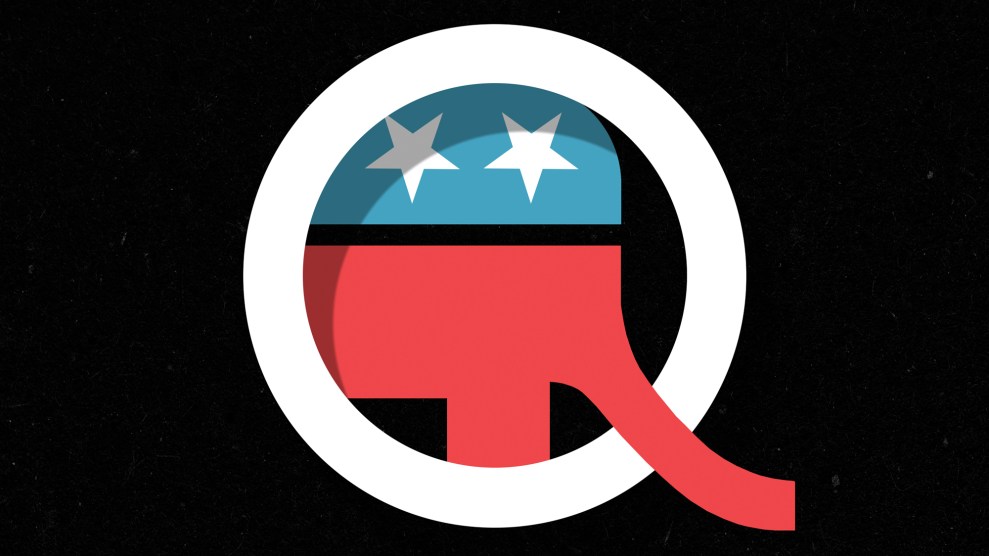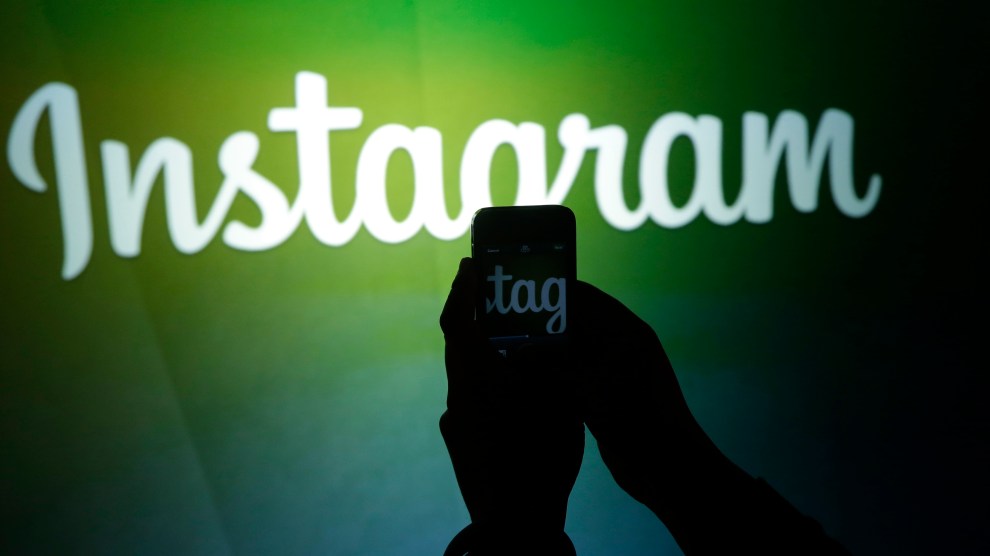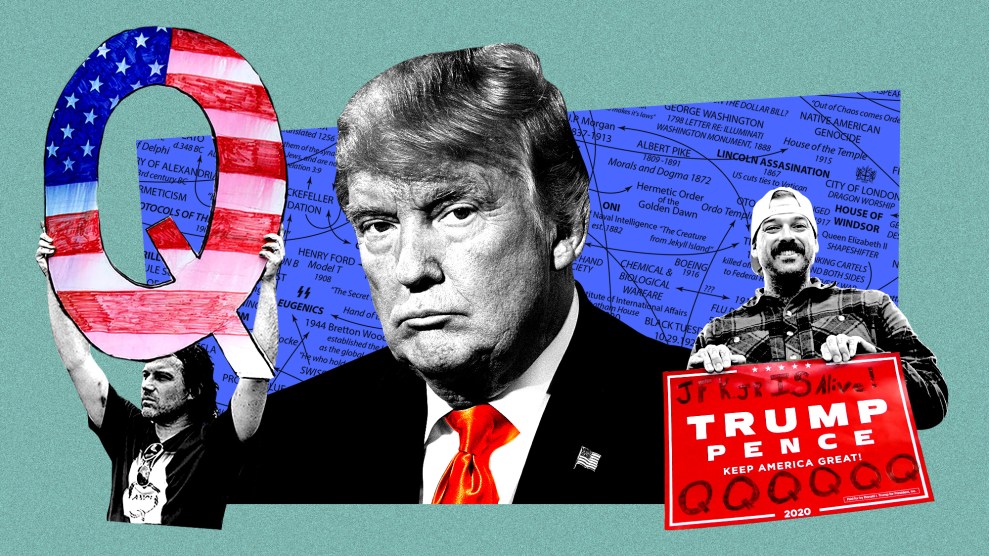
Rob Dobi
For the last several years, faithful adherents of QAnon have dared reporters to ask President Trump about the conspiracy. As a journalist who has interviewed Q fans in person and interacted with them on Twitter, I can tell you that this is where most such conservations eventually end. The anticipated moment where Trump would receive this question has been a longstanding dream of the community whose members believe, without proof or evidence, that President Trump is locked in a battle with deep state government bureaucrats over his attempts to bring down a cabal of elite liberal pedophiles.
This week, the question finally came, twice. The first time, on Friday, Trump ignored it. The second time, during a Wednesday press briefing, he gave the approving answer that the conspiracy community had eagerly been waiting for:
“Well, I don’t know much about the movement other than I understand they like me very much…which I appreciate it. But I don’t know much about the movement. I have heard it is gaining popularity,” Trump said. “These are people who don’t like what’s going on in places like Portland and places like Chicago and New York and other cities, and states. I’ve heard these are people who love our country.”
The president’s comments were presaged at the end of July, when relatively high-profile Fox News host Jesse Watters praised the sprawling conspiracy theory. “Q can do some crazy stuff with the pizza stuff and the Wayfair stuff, but they’ve also done a lot of great stuff when it comes to Epstein and it comes to the deep state,” Watters claimed, referring to the solidly debunked theories about a pizza restaurant and online furniture store running child trafficking rings. He later tried to walk his comment back in a media statement saying that he doesn’t “support or believe in” QAnon and that his “comments should not be mistaken for giving credence” to the movement.
Watters’ on-air endorsement of QAnon was Fox’s most explicit endorsement of the conspiracy, yet its only one in a growing number of dalliances the network has had with it. Just days earlier, Fox Nation, the cable news channel’s internet streaming spin-off, announced a new show starring former Grey’s Anatomy cast member Isaiah Washington, who is a QAnon supporter. Media Matters has documented Washington’s regular posts boosting the theory.
That same week, former journalist Timothy Burke noticed Ed Mullins, a New York City police union boss, had appeared on Fox News with a QAnon mug over his shoulder. Like Watters, Mullins tried to distance himself from the theory despite having appeared with the mug on multiple appearances on the network.
New York police union boss just appeared on Fox News with a Qanon mug pic.twitter.com/w3HMHEtVuj
— Timothy Burke (@bubbaprog) July 17, 2020
Fox News isn’t usually the one to get red-pilled. Over the last several decades, the conspiracy-slinging cable news channel that gives neo-Nazis’ favorite TV host, Tucker Carlson, five primetime hours each week to speak on whatever he chooses, has usually served to drag its already solidly Republican viewership further to the right. But lately, that dynamic has been reversed when it comes to QAnon, with the network following receptive viewers.
Together, Trump and Fox News are perhaps the country’s two most influential conservative messengers, and their increasing public affiliation with Q is only one piece of a growing body of evidence that the conspiracy theory is now either mainstream or rapidly barreling towards it. QAnon has made quick but heavy overtures into separate but important and large communities over the past year. Alex Kaplan at Media Matters has tracked and documented how dozens of candidates across the country who claim to be a part of the Q faithful are running for elected office, including some with a legitimate shot at winning their races. And evidently, the Republican nominee for president thinks it’s okay too.
As recently as March, QAnon was still a mostly fringe phenomenon. It was well known among the MAGA set, but too hot for anyone in the mainstream to touch. Gen. Michael Flynn, for example, pulled out of a fundraising event for his legal defense in August 2019, after Mother Jones reported on the event’s links to the conspiracy theory.
Whatever shame Flynn, the former head of the Defense Intelligence Agency and Trump’s first national security adviser, felt in August has by now disappeared. At the end of June, after an appeals court panel ordered a federal judge to drop the Justice Department’s case against him, Flynn started boldly aligning himself with the conspiracy theory. On July 4th, he posted a video online of him leading a small group, reciting an oath of office and finishing with “Where we go one, we go all,” a common QAnon motto. Above the video, Flynn wrote another of the conspiracy’s slogans: #TakeTheOath.
Flynn is not alone. Carter Page, his fellow disgraced Trump foreign policy adviser, joined in posting QAnon mottos this month. Even the president’s son Eric has posted (and then quickly deleted) Q content this summer.
In less traditionally influential but still important spaces, Q has made clear inroads. Over the last several months, anti-vaxxers and wellness and lifestyle influencers on Instagram have started posting QAnon inspired videos of themselves ranting about liberal pedophile rings. That trend shows how the conspiracy theory has taken root beyond Trump-voting suburbanites in red states.
Travis View, an independent conspiracy researcher who has extensively followed QAnon and hosts the podcast QAnon Anonymous, says the movement’s growing diversity is proof that it’s increasingly trending mainstream. In late July, he and his podcast cohosts went to a Save the Children rally in Los Angeles, a thinly veiled pro-QAnon event, where they saw a seemingly diverse group of people across age and race backing QAnon.
“It was constrained to the very online far-right, then after it spilled out of 8chan it went to white boomers,” View said, referring to the message board that, until it was taken down in August 2019, hosted cryptic messages from Q, the unidentified poster at the conspiracy’s center. “Now we see a lot of younger people. There’s not-white people getting into it.”
Internet traffic data backs up the idea that QAnon has crossed into the mainstream. Since mid-March, around the time coronavirus lockdowns swept the US, Google searches for QAnon and related subjects, Wikipedia page views for the conspiracy, and related Twitter mentions have not only spiked to all-time highs, but have continued to be higher than at almost any time before the virus hit. As a rough comparison, since the start of the coronavirus lockdowns in the US. QAnon has pulled in more Wikipedia pageviews than pages discussing the George Floyd protests or Black Lives Matter. In July, Wikipedia pages for QAnon and its prequel theory, Pizzagate, were the 14th and 15th most viewed pages on the site.
As the QAnon community has grown, new members have taken part in massive harassment rampages against local politicians, A-list celebrities, and online furniture retailers. Such incidents form the backdrop for Facebook’s Wednesday announcement of a new crackdown targeting QAnon and other groups’ ability to organize on the platform. But the move only came after interest in the conspiracy had exploded on Facebook. Marc-André Argentino, a PhD candidate at Concordia University who researches extremism, tracked 179 QAnon Facebook groups, finding their membership spiked from 213,000 members in early March to 1.4 million as of July. (Argentino says such groups became far more common across this spring and summer; when he began the study, he was only able to find 60.) The amount of “likes” on Q pages across that time jumped from 400,000 to over 900,000. Julia Carie Wong at the Guardian has recorded large growth of QAnon on Facebook as well.
Part of the growth is from a newfound audience abroad. In February, Tobias Rathjen killed nine people in a shisha bar in Hanau, Germany. Rathjen, among a host of other abhorrent things, believed that there were secret underground military bases in the United States where people “worship the devil himself,” and “abuse, torture and kill little children.” While he didn’t mention QAnon by name, he almost certainly drew from the theory.
If so, Rathjen wasn’t an aberration, but was a part of a growing contingent of QAnon supporters in Europe. New York-based media outlet Coda Story reported that German YouTube channels and Telegram messaging groups discussing the conspiracy have seen massive growth since March, as protestors with homemade signs pushing the group’s beliefs have made cameos at right-wing rallies. In some countries, like Romania, rallies solely designed to support QAnon and Trump have taken place. Vice News reported that around 50 people showed up for a July weekend QAnon festival in Finland.
Exactly why QAnon is going mainstream now is a complicated question with no single answer. One of the main drivers, as in the Satanic Panic of the 1980s, is that QAnon is an extremely useful right-wing political project that can be used to justify fighting against social progress. But the main catalyst of its current round of growth is probably the coronavirus.
“It’s always safer to just note caution, but with the pandemic, there’s definitely causation,” Argentino says, citing the growth that occurred after the imposition of lockdowns and sheltering in place. With people cooped up in their homes using the internet, there’s been more time for YouTube and Facebook’s recommendation algorithms to lead people down QAnon rabbit holes.
The lockdowns have also been deeply alienating and atomizing for many. That, in addition to coronavirus-induced anxiety and America’s history of real and false conspiracies, help provide fertile conditions for conspiracies, particularly among reactionaries.
QAnon supporters are also taking their own savvy measures to boost their campaign. Q lingered on the fringes of Republican politics for a long time partially because it’s hard to get a lot of people to buy into the idea that famous people are keeping hordes of children in underground tunnels that no one has seemed to notice. In the past month though, QAnoners have taken to coopting the #SaveTheChildren hashtag and catchphrase and jamming it alongside their own Q specific hashtags like #QANON and #WWG1WGA (short for “where we go one, we go all”), highlighting aspects of their belief that suggest they are group that just cares about helping vulnerable kids.
“It’s a very sort of low commitment entry point,” View said of QAnon’s #SaveTheChildren pivot. “It’s very subtle. ‘We’re against pedophilia and we’re for saving the children.’ Obviously everyone is against that. It’s all just a front for their more extreme ideas, though.”
After they pass through that first altruistically framed gate, View explained, the curious are brought to the next step: “‘We’re saving the children from a liberal elite cabal.'” It’s a harder pill to swallow, but is easier after buying the initial child-endangerment premise.
Not all researchers are on the same page. Political science professor Joseph Uscinski, who studies conspiracists at the University of Miami, rejects the idea that QAnon has grown during the coronavirus lockdowns. “I’ve been polling on this for two years. It hasn’t gotten more popular or bigger,” Uscinski says, citing his most recent poll from June that found no evidence for growing QAnon support. “I’m reading headlines from reporters on the tech beat, that while are well-intentioned, aren’t tethered to reality.”
To Uscinski, other data points like the growth of Facebook groups, or increased discourse about QAnon on Twitter aren’t useful. “TikTok and Facebook groups aren’t the real world,” he said, citing the value of traditional public opinion research. “If Biden’s getting support, we wouldn’t know because of Facebook groups. We’d know because there’s polling on it.”
Uscinki could be right. But the conventional tool of polling may be unsuited to measure a firmly unconventional form of politics. Besides the logistical hurdles of getting sincere answers on the phone from paranoid people who believe in a murderous, all-powerful elite, the number of outright adherents doesn’t necessarily reflect influence. Many of the movement’s followers who I’ve spoken with can’t fully agree on what it is. Some say that they support Q, without believing central tenets like the existence of a liberal pedophile ring. Others believe in outlandish underground child sex rings, but don’t specifically align themselves with QAnon. It is anyone’s guess how the movement’s lack of cohesion and coherence could shape polling responses.
While QAnon followership, in its most formal interpretation, might be somewhat limited, the movement has demonstrated real and growing power. Its followers were able to launch harassment campaigns so big and vitriolic that several high-profile targets—Wayfair, Oprah Winfrey, and Chrissy Teigen—felt the need to publicly respond. Q’s followers have also mobilized to influence political discourse, with dozens of aligned candidates on ballots in races across the country, including two congressional candidates with real shots at winning and a senatorial candidate. Q’s followers have mobilized to antagonize and harass a state senator in California in a vicious attempt to get him to drop legislation aimed at addressing LGBTQ inequality. Even if Uscinki’s caution about its growth is correct, QAnon’s damage is too big to ignore.


















